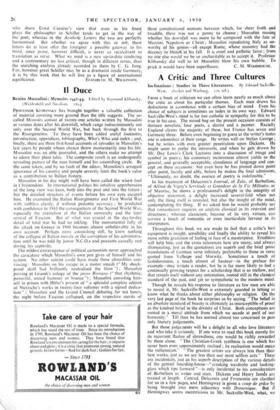I I Duce
Benito Mussolini: Memoirs 1941-43. Edited by Raymond Klibansky.
(We Weide Id and N icolson 8s.) PROFESSOR KLIBANSKY has brought together a valuable collection of material covering more ground than the title suggests. The so- called Memoirs consist of twenty-one articles written by Mussolini at various dates after his downfall, which range indiscriminately not only over the Second World War, but back through the first to the Risorgimento. To these have been added useful footnotes, introduction, appendices, bibliography, Who's Who and index ; and, finally, there are three first-hand accounts of episodes in Mussolini's last years by people whom chance threw momentarily into his life. Mussolini was an able journalist, and the others make no attempt to adorn their plain tales. The composite result is an undesignedly revealing picture of the man himself and his astonishing circle. By the same token, and by no fault of the editor, Mussolini's arrogant ignorance of his country and people severely limit the book's value as a contribution to Italian history.
Mussolini in his day might well have been called the wisest fool in Christendom. In international politics his intuitive apprehension of the long view was keen, both into the past and into the future ; but the detailed structure of events before his own eyes escaped him. He examined the Italian Risorgimento and First World War with ruthless clarity, if without pedantic accuracy ; he predicted with confidence in 1943 the consequences of the Second World War, especially the extinction of the Italian monarchy and the later revival of Fascism. But of what was crucial in the day-to-day detail of total war he had no inkling. The monumental folly of the attack on Greece in 1940 becomes almost unbelievable in his own account. Perhaps more astonishing still, he knew nothing of the collapse of Italian morale or the corruption of his administra- tion until he was told by junior N.C.O.s and peasants casually met during his captivity.
The wildest extravagance of political cartoonists never approached the caricature which Mussolini's own pen gives of himself and his system. No other satirist could have made these absurdities con- vincing: Mussolini on his escape in a motor smash (" My shock- proof skull had brilliantly neutralised the blow ") ; Mussolini purring at Grandi's eulogy of the passo Romano (" that rhythmic, powerful, united hammer of bronze ") ; Mussolini consoling him- self in prison with Hitler's present of " a splendid complete edition of Nietzsche's works in twenty-four volumes with a signed dedica- tion " ; Mussolini and the Grand Council debating for ten hours, the night before Fascism collapsed, on the respective merits of
three constitutional motions between which, for sheer froth and twaddle, there was not a penny to choose ; Mussolini musing whether his downfall was more to be compared with the fate of Mazzini, Napoleon or Christ ; Mussolini repudiating Italy as un- worthy of his genius—all except Rome, whose masonry had the decency to blenck$ at his fall. It is cruel and pathetic farce ; from no one else would we bp-so uncharitable as to accept it. Professor Klibansky did well to let Mussolini blow his own bubble. To
prick it would have been superfluous. C. M. WOODHOUSE.






































 Previous page
Previous page